Professional Identity and Practice: Hilton Hotel Supervisor Role
VerifiedAdded on 2021/02/19
|17
|4585
|59
Report
AI Summary
This report examines the importance of ongoing professional development and self-directed learning for enhancing professional identity and career opportunities, specifically focusing on a supervisor role at Hilton Hotel. The assignment explores the key benefits of professional development for various stakeholders, including employers and employees, and investigates employer expectations of skills and competencies. It includes a self-assessment of abilities, skills, and competencies using SWOT analysis and personality trait assessment, alongside a discussion of relevant learning theories and approaches such as the VAK learning cycle. The report culminates in a professional development plan designed to enhance chosen skills and competencies within a work context and includes a simulated job interview, evaluating its strengths and weaknesses. The report aims to provide a comprehensive understanding of professional development within the service industry, highlighting practical applications and theoretical underpinnings to enhance the supervisor's effectiveness.
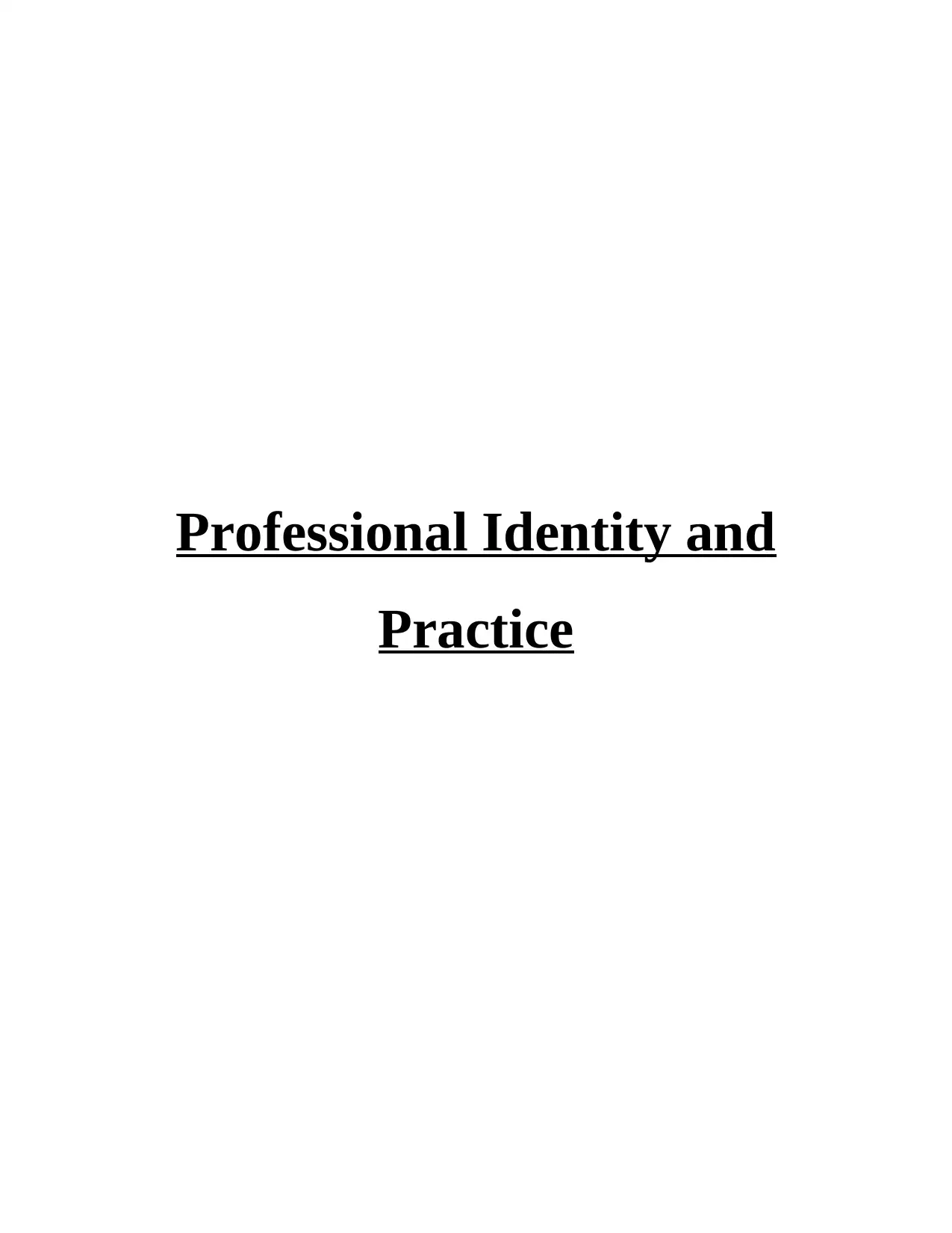
Professional Identity and
Practice
Practice
Paraphrase This Document
Need a fresh take? Get an instant paraphrase of this document with our AI Paraphraser
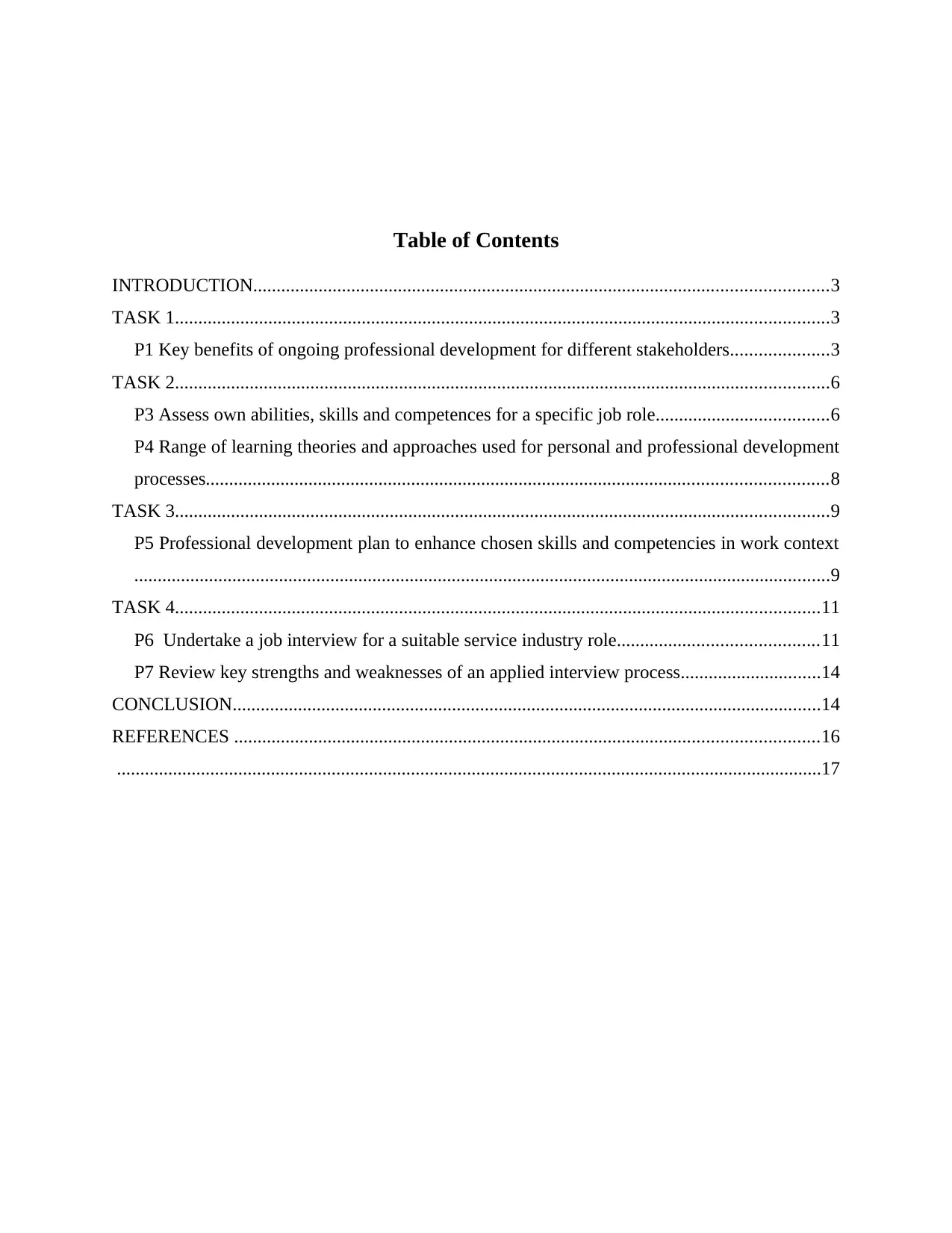
Table of Contents
INTRODUCTION...........................................................................................................................3
TASK 1............................................................................................................................................3
P1 Key benefits of ongoing professional development for different stakeholders.....................3
TASK 2............................................................................................................................................6
P3 Assess own abilities, skills and competences for a specific job role.....................................6
P4 Range of learning theories and approaches used for personal and professional development
processes.....................................................................................................................................8
TASK 3............................................................................................................................................9
P5 Professional development plan to enhance chosen skills and competencies in work context
.....................................................................................................................................................9
TASK 4..........................................................................................................................................11
P6 Undertake a job interview for a suitable service industry role...........................................11
P7 Review key strengths and weaknesses of an applied interview process..............................14
CONCLUSION..............................................................................................................................14
REFERENCES .............................................................................................................................16
.......................................................................................................................................................17
INTRODUCTION...........................................................................................................................3
TASK 1............................................................................................................................................3
P1 Key benefits of ongoing professional development for different stakeholders.....................3
TASK 2............................................................................................................................................6
P3 Assess own abilities, skills and competences for a specific job role.....................................6
P4 Range of learning theories and approaches used for personal and professional development
processes.....................................................................................................................................8
TASK 3............................................................................................................................................9
P5 Professional development plan to enhance chosen skills and competencies in work context
.....................................................................................................................................................9
TASK 4..........................................................................................................................................11
P6 Undertake a job interview for a suitable service industry role...........................................11
P7 Review key strengths and weaknesses of an applied interview process..............................14
CONCLUSION..............................................................................................................................14
REFERENCES .............................................................................................................................16
.......................................................................................................................................................17
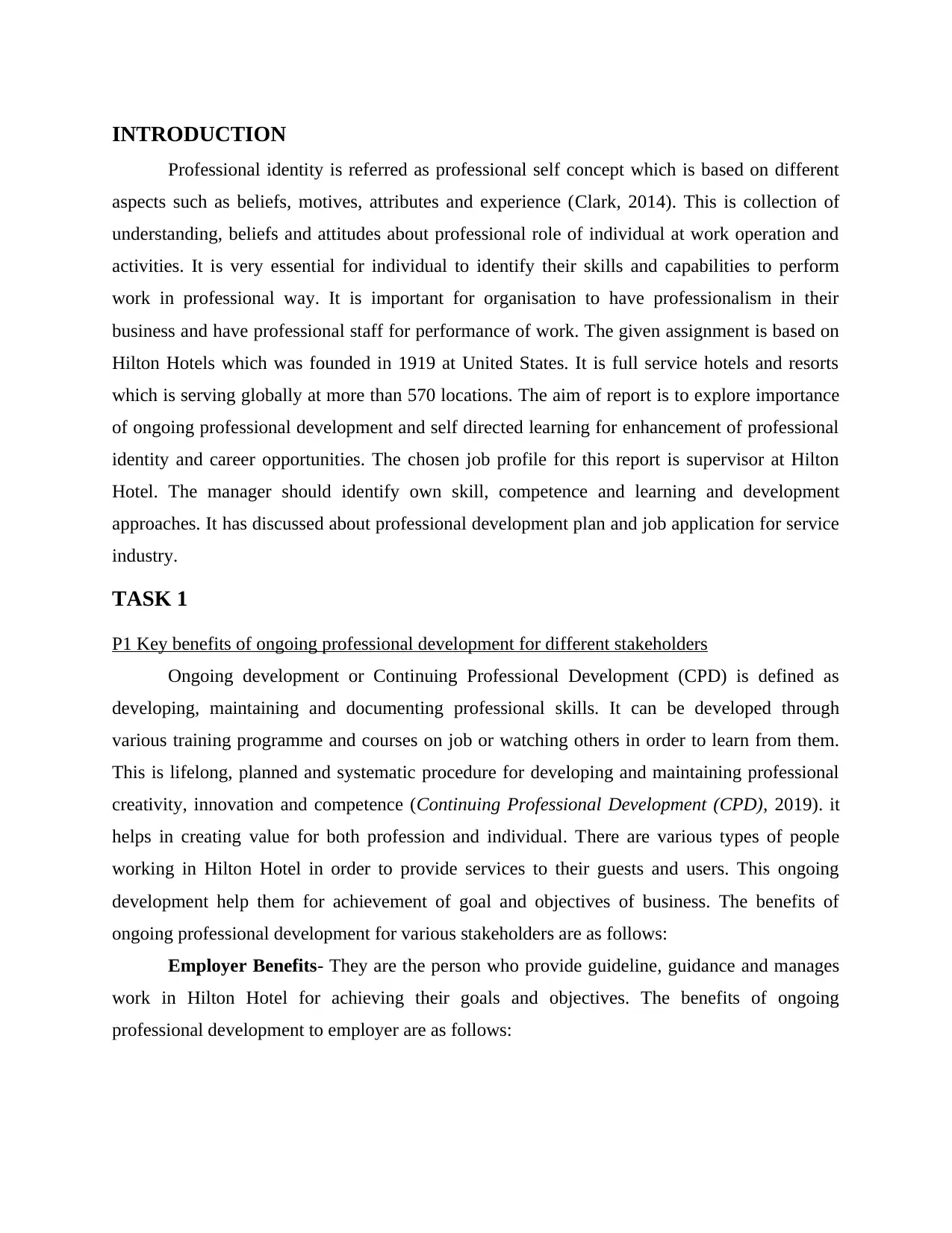
INTRODUCTION
Professional identity is referred as professional self concept which is based on different
aspects such as beliefs, motives, attributes and experience (Clark, 2014). This is collection of
understanding, beliefs and attitudes about professional role of individual at work operation and
activities. It is very essential for individual to identify their skills and capabilities to perform
work in professional way. It is important for organisation to have professionalism in their
business and have professional staff for performance of work. The given assignment is based on
Hilton Hotels which was founded in 1919 at United States. It is full service hotels and resorts
which is serving globally at more than 570 locations. The aim of report is to explore importance
of ongoing professional development and self directed learning for enhancement of professional
identity and career opportunities. The chosen job profile for this report is supervisor at Hilton
Hotel. The manager should identify own skill, competence and learning and development
approaches. It has discussed about professional development plan and job application for service
industry.
TASK 1
P1 Key benefits of ongoing professional development for different stakeholders
Ongoing development or Continuing Professional Development (CPD) is defined as
developing, maintaining and documenting professional skills. It can be developed through
various training programme and courses on job or watching others in order to learn from them.
This is lifelong, planned and systematic procedure for developing and maintaining professional
creativity, innovation and competence (Continuing Professional Development (CPD), 2019). it
helps in creating value for both profession and individual. There are various types of people
working in Hilton Hotel in order to provide services to their guests and users. This ongoing
development help them for achievement of goal and objectives of business. The benefits of
ongoing professional development for various stakeholders are as follows:
Employer Benefits- They are the person who provide guideline, guidance and manages
work in Hilton Hotel for achieving their goals and objectives. The benefits of ongoing
professional development to employer are as follows:
Professional identity is referred as professional self concept which is based on different
aspects such as beliefs, motives, attributes and experience (Clark, 2014). This is collection of
understanding, beliefs and attitudes about professional role of individual at work operation and
activities. It is very essential for individual to identify their skills and capabilities to perform
work in professional way. It is important for organisation to have professionalism in their
business and have professional staff for performance of work. The given assignment is based on
Hilton Hotels which was founded in 1919 at United States. It is full service hotels and resorts
which is serving globally at more than 570 locations. The aim of report is to explore importance
of ongoing professional development and self directed learning for enhancement of professional
identity and career opportunities. The chosen job profile for this report is supervisor at Hilton
Hotel. The manager should identify own skill, competence and learning and development
approaches. It has discussed about professional development plan and job application for service
industry.
TASK 1
P1 Key benefits of ongoing professional development for different stakeholders
Ongoing development or Continuing Professional Development (CPD) is defined as
developing, maintaining and documenting professional skills. It can be developed through
various training programme and courses on job or watching others in order to learn from them.
This is lifelong, planned and systematic procedure for developing and maintaining professional
creativity, innovation and competence (Continuing Professional Development (CPD), 2019). it
helps in creating value for both profession and individual. There are various types of people
working in Hilton Hotel in order to provide services to their guests and users. This ongoing
development help them for achievement of goal and objectives of business. The benefits of
ongoing professional development for various stakeholders are as follows:
Employer Benefits- They are the person who provide guideline, guidance and manages
work in Hilton Hotel for achieving their goals and objectives. The benefits of ongoing
professional development to employer are as follows:
⊘ This is a preview!⊘
Do you want full access?
Subscribe today to unlock all pages.

Trusted by 1+ million students worldwide
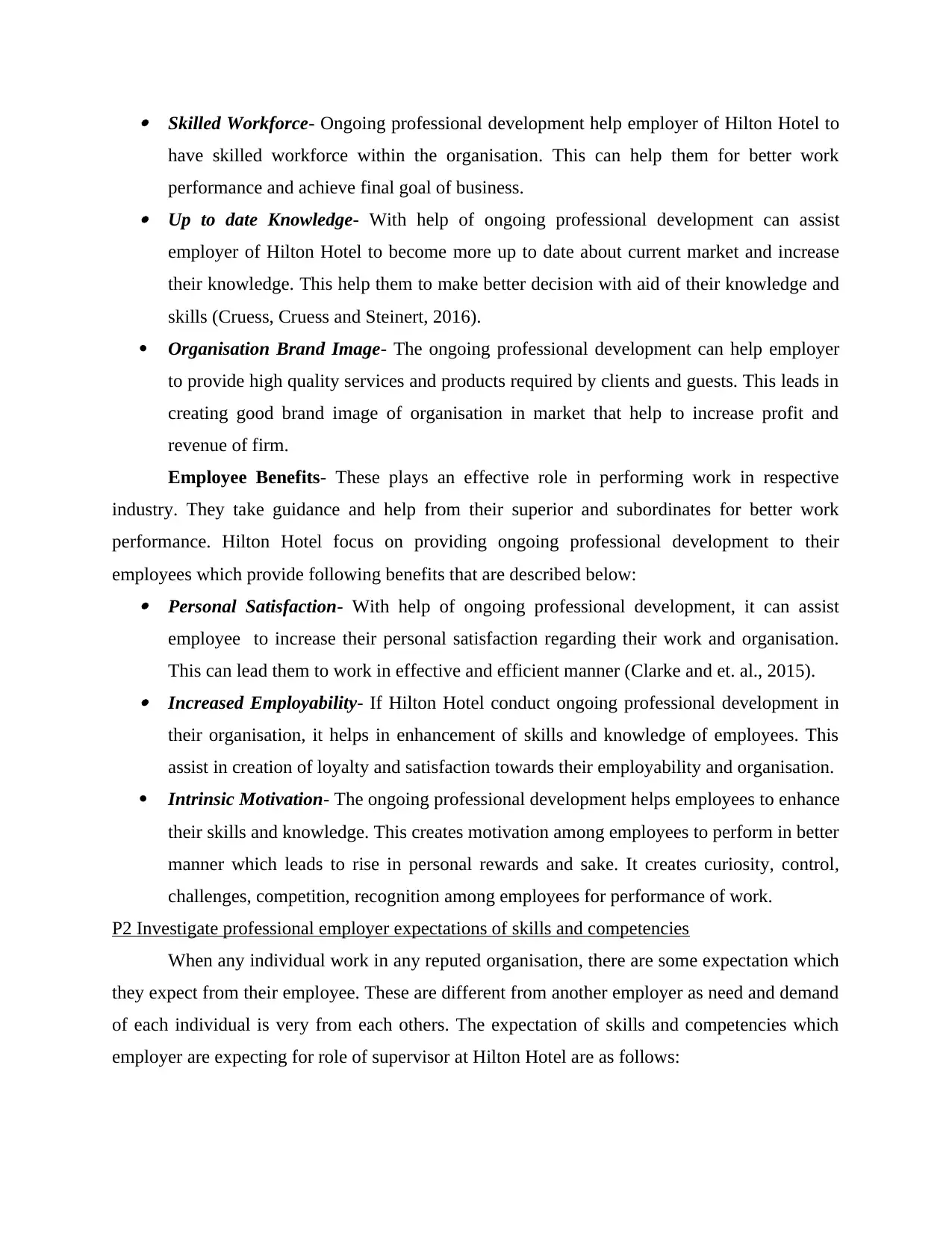
Skilled Workforce- Ongoing professional development help employer of Hilton Hotel to
have skilled workforce within the organisation. This can help them for better work
performance and achieve final goal of business. Up to date Knowledge- With help of ongoing professional development can assist
employer of Hilton Hotel to become more up to date about current market and increase
their knowledge. This help them to make better decision with aid of their knowledge and
skills (Cruess, Cruess and Steinert, 2016).
Organisation Brand Image- The ongoing professional development can help employer
to provide high quality services and products required by clients and guests. This leads in
creating good brand image of organisation in market that help to increase profit and
revenue of firm.
Employee Benefits- These plays an effective role in performing work in respective
industry. They take guidance and help from their superior and subordinates for better work
performance. Hilton Hotel focus on providing ongoing professional development to their
employees which provide following benefits that are described below: Personal Satisfaction- With help of ongoing professional development, it can assist
employee to increase their personal satisfaction regarding their work and organisation.
This can lead them to work in effective and efficient manner (Clarke and et. al., 2015). Increased Employability- If Hilton Hotel conduct ongoing professional development in
their organisation, it helps in enhancement of skills and knowledge of employees. This
assist in creation of loyalty and satisfaction towards their employability and organisation.
Intrinsic Motivation- The ongoing professional development helps employees to enhance
their skills and knowledge. This creates motivation among employees to perform in better
manner which leads to rise in personal rewards and sake. It creates curiosity, control,
challenges, competition, recognition among employees for performance of work.
P2 Investigate professional employer expectations of skills and competencies
When any individual work in any reputed organisation, there are some expectation which
they expect from their employee. These are different from another employer as need and demand
of each individual is very from each others. The expectation of skills and competencies which
employer are expecting for role of supervisor at Hilton Hotel are as follows:
have skilled workforce within the organisation. This can help them for better work
performance and achieve final goal of business. Up to date Knowledge- With help of ongoing professional development can assist
employer of Hilton Hotel to become more up to date about current market and increase
their knowledge. This help them to make better decision with aid of their knowledge and
skills (Cruess, Cruess and Steinert, 2016).
Organisation Brand Image- The ongoing professional development can help employer
to provide high quality services and products required by clients and guests. This leads in
creating good brand image of organisation in market that help to increase profit and
revenue of firm.
Employee Benefits- These plays an effective role in performing work in respective
industry. They take guidance and help from their superior and subordinates for better work
performance. Hilton Hotel focus on providing ongoing professional development to their
employees which provide following benefits that are described below: Personal Satisfaction- With help of ongoing professional development, it can assist
employee to increase their personal satisfaction regarding their work and organisation.
This can lead them to work in effective and efficient manner (Clarke and et. al., 2015). Increased Employability- If Hilton Hotel conduct ongoing professional development in
their organisation, it helps in enhancement of skills and knowledge of employees. This
assist in creation of loyalty and satisfaction towards their employability and organisation.
Intrinsic Motivation- The ongoing professional development helps employees to enhance
their skills and knowledge. This creates motivation among employees to perform in better
manner which leads to rise in personal rewards and sake. It creates curiosity, control,
challenges, competition, recognition among employees for performance of work.
P2 Investigate professional employer expectations of skills and competencies
When any individual work in any reputed organisation, there are some expectation which
they expect from their employee. These are different from another employer as need and demand
of each individual is very from each others. The expectation of skills and competencies which
employer are expecting for role of supervisor at Hilton Hotel are as follows:
Paraphrase This Document
Need a fresh take? Get an instant paraphrase of this document with our AI Paraphraser
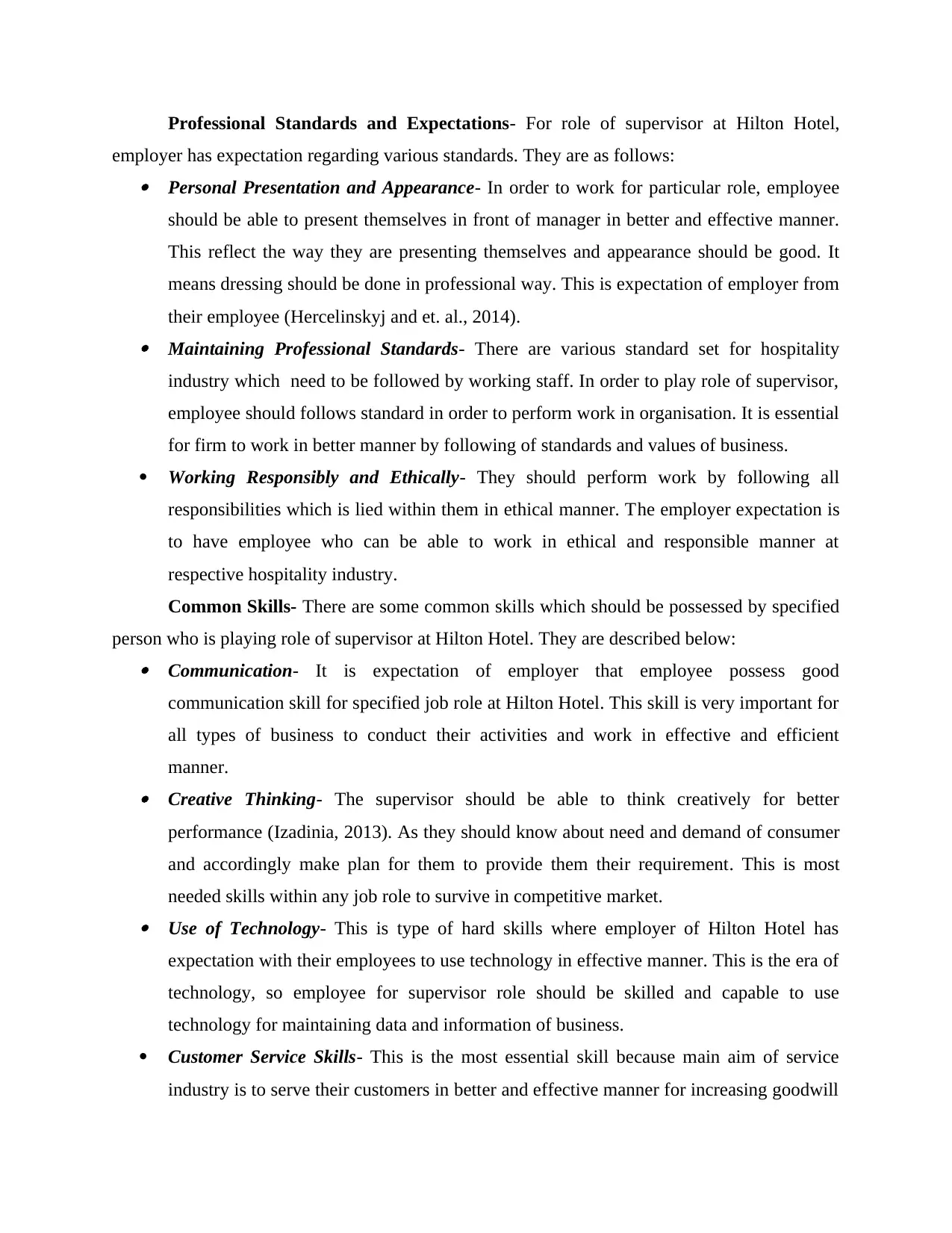
Professional Standards and Expectations- For role of supervisor at Hilton Hotel,
employer has expectation regarding various standards. They are as follows: Personal Presentation and Appearance- In order to work for particular role, employee
should be able to present themselves in front of manager in better and effective manner.
This reflect the way they are presenting themselves and appearance should be good. It
means dressing should be done in professional way. This is expectation of employer from
their employee (Hercelinskyj and et. al., 2014). Maintaining Professional Standards- There are various standard set for hospitality
industry which need to be followed by working staff. In order to play role of supervisor,
employee should follows standard in order to perform work in organisation. It is essential
for firm to work in better manner by following of standards and values of business.
Working Responsibly and Ethically- They should perform work by following all
responsibilities which is lied within them in ethical manner. The employer expectation is
to have employee who can be able to work in ethical and responsible manner at
respective hospitality industry.
Common Skills- There are some common skills which should be possessed by specified
person who is playing role of supervisor at Hilton Hotel. They are described below: Communication- It is expectation of employer that employee possess good
communication skill for specified job role at Hilton Hotel. This skill is very important for
all types of business to conduct their activities and work in effective and efficient
manner. Creative Thinking- The supervisor should be able to think creatively for better
performance (Izadinia, 2013). As they should know about need and demand of consumer
and accordingly make plan for them to provide them their requirement. This is most
needed skills within any job role to survive in competitive market. Use of Technology- This is type of hard skills where employer of Hilton Hotel has
expectation with their employees to use technology in effective manner. This is the era of
technology, so employee for supervisor role should be skilled and capable to use
technology for maintaining data and information of business.
Customer Service Skills- This is the most essential skill because main aim of service
industry is to serve their customers in better and effective manner for increasing goodwill
employer has expectation regarding various standards. They are as follows: Personal Presentation and Appearance- In order to work for particular role, employee
should be able to present themselves in front of manager in better and effective manner.
This reflect the way they are presenting themselves and appearance should be good. It
means dressing should be done in professional way. This is expectation of employer from
their employee (Hercelinskyj and et. al., 2014). Maintaining Professional Standards- There are various standard set for hospitality
industry which need to be followed by working staff. In order to play role of supervisor,
employee should follows standard in order to perform work in organisation. It is essential
for firm to work in better manner by following of standards and values of business.
Working Responsibly and Ethically- They should perform work by following all
responsibilities which is lied within them in ethical manner. The employer expectation is
to have employee who can be able to work in ethical and responsible manner at
respective hospitality industry.
Common Skills- There are some common skills which should be possessed by specified
person who is playing role of supervisor at Hilton Hotel. They are described below: Communication- It is expectation of employer that employee possess good
communication skill for specified job role at Hilton Hotel. This skill is very important for
all types of business to conduct their activities and work in effective and efficient
manner. Creative Thinking- The supervisor should be able to think creatively for better
performance (Izadinia, 2013). As they should know about need and demand of consumer
and accordingly make plan for them to provide them their requirement. This is most
needed skills within any job role to survive in competitive market. Use of Technology- This is type of hard skills where employer of Hilton Hotel has
expectation with their employees to use technology in effective manner. This is the era of
technology, so employee for supervisor role should be skilled and capable to use
technology for maintaining data and information of business.
Customer Service Skills- This is the most essential skill because main aim of service
industry is to serve their customers in better and effective manner for increasing goodwill
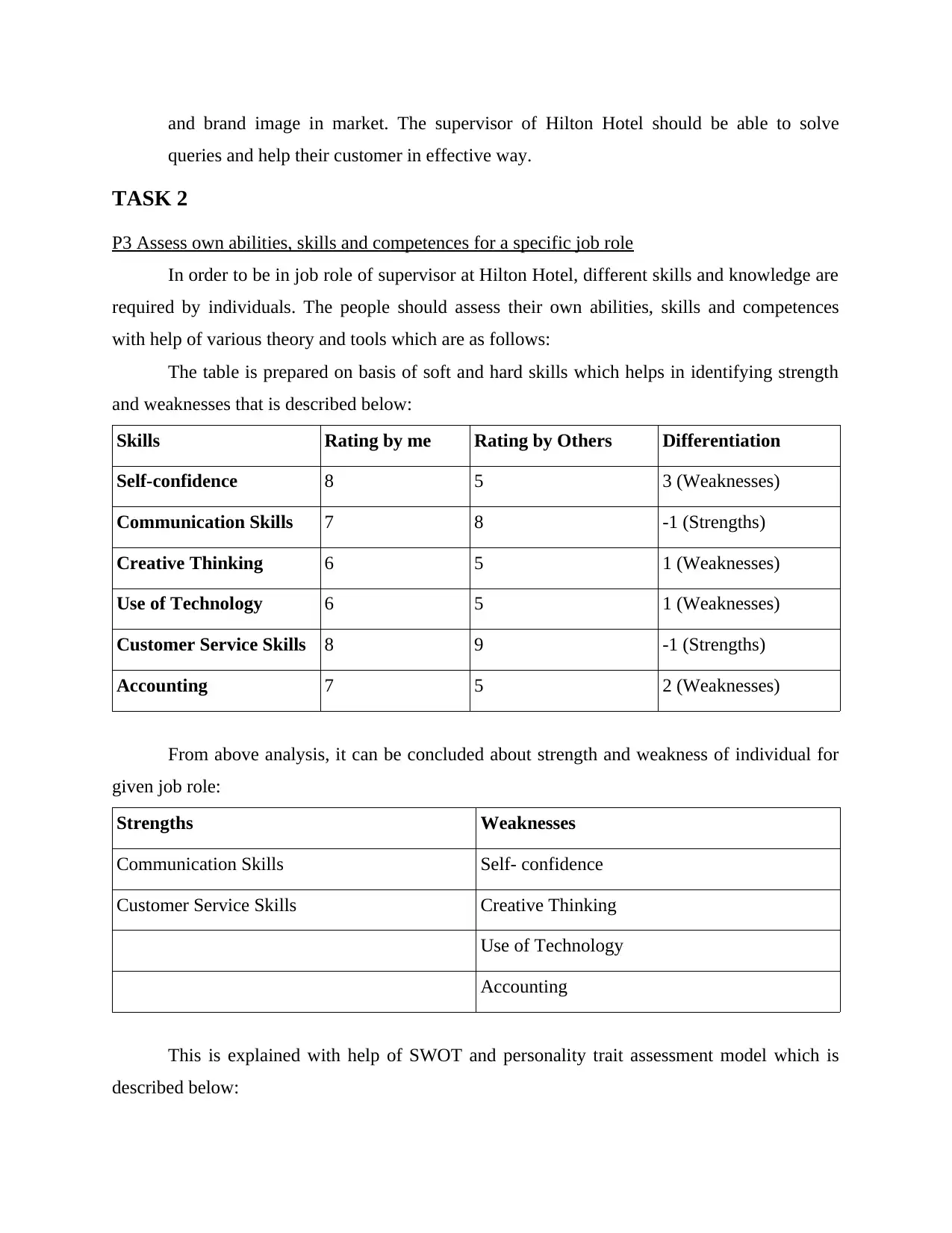
and brand image in market. The supervisor of Hilton Hotel should be able to solve
queries and help their customer in effective way.
TASK 2
P3 Assess own abilities, skills and competences for a specific job role
In order to be in job role of supervisor at Hilton Hotel, different skills and knowledge are
required by individuals. The people should assess their own abilities, skills and competences
with help of various theory and tools which are as follows:
The table is prepared on basis of soft and hard skills which helps in identifying strength
and weaknesses that is described below:
Skills Rating by me Rating by Others Differentiation
Self-confidence 8 5 3 (Weaknesses)
Communication Skills 7 8 -1 (Strengths)
Creative Thinking 6 5 1 (Weaknesses)
Use of Technology 6 5 1 (Weaknesses)
Customer Service Skills 8 9 -1 (Strengths)
Accounting 7 5 2 (Weaknesses)
From above analysis, it can be concluded about strength and weakness of individual for
given job role:
Strengths Weaknesses
Communication Skills Self- confidence
Customer Service Skills Creative Thinking
Use of Technology
Accounting
This is explained with help of SWOT and personality trait assessment model which is
described below:
queries and help their customer in effective way.
TASK 2
P3 Assess own abilities, skills and competences for a specific job role
In order to be in job role of supervisor at Hilton Hotel, different skills and knowledge are
required by individuals. The people should assess their own abilities, skills and competences
with help of various theory and tools which are as follows:
The table is prepared on basis of soft and hard skills which helps in identifying strength
and weaknesses that is described below:
Skills Rating by me Rating by Others Differentiation
Self-confidence 8 5 3 (Weaknesses)
Communication Skills 7 8 -1 (Strengths)
Creative Thinking 6 5 1 (Weaknesses)
Use of Technology 6 5 1 (Weaknesses)
Customer Service Skills 8 9 -1 (Strengths)
Accounting 7 5 2 (Weaknesses)
From above analysis, it can be concluded about strength and weakness of individual for
given job role:
Strengths Weaknesses
Communication Skills Self- confidence
Customer Service Skills Creative Thinking
Use of Technology
Accounting
This is explained with help of SWOT and personality trait assessment model which is
described below:
⊘ This is a preview!⊘
Do you want full access?
Subscribe today to unlock all pages.

Trusted by 1+ million students worldwide
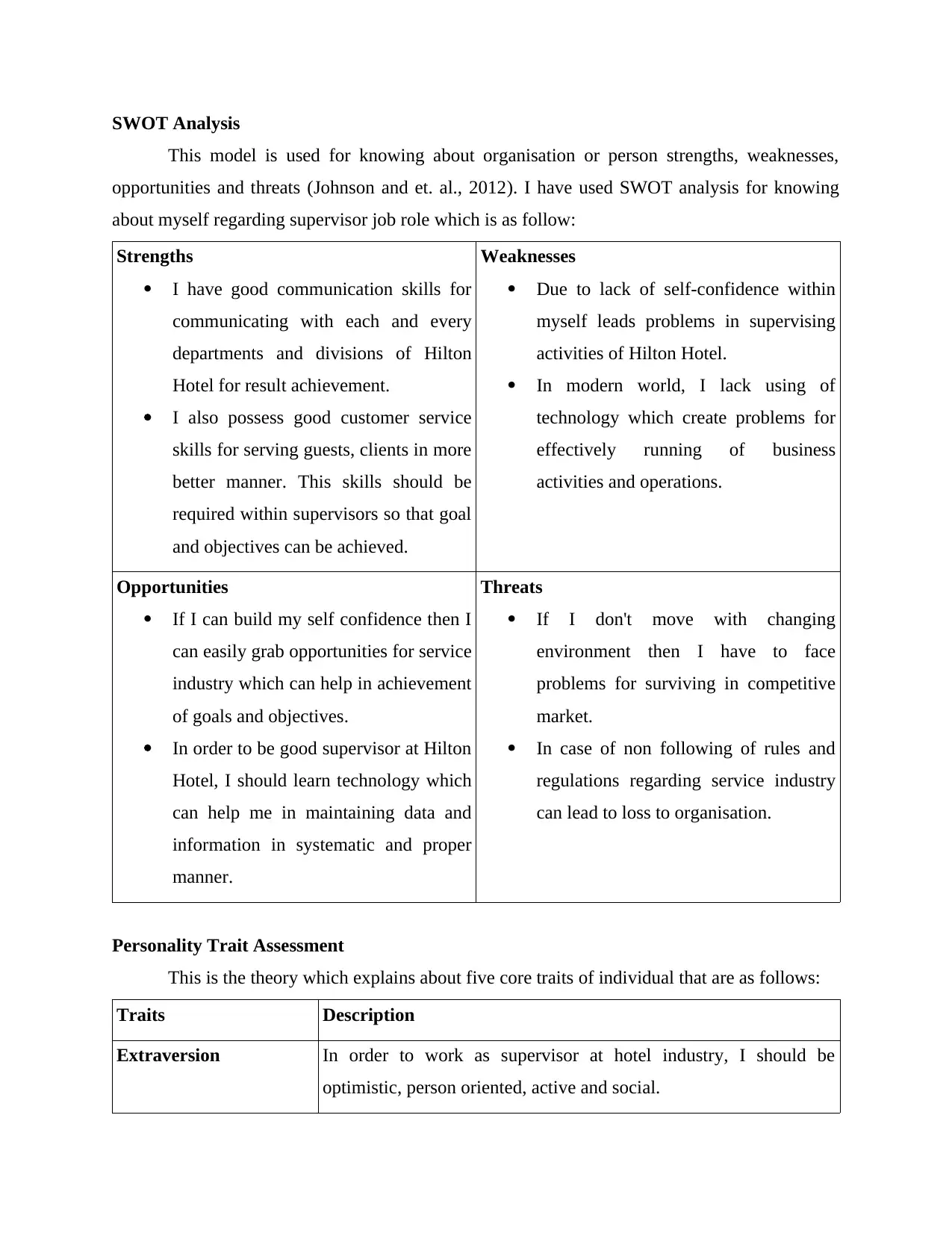
SWOT Analysis
This model is used for knowing about organisation or person strengths, weaknesses,
opportunities and threats (Johnson and et. al., 2012). I have used SWOT analysis for knowing
about myself regarding supervisor job role which is as follow:
Strengths
I have good communication skills for
communicating with each and every
departments and divisions of Hilton
Hotel for result achievement.
I also possess good customer service
skills for serving guests, clients in more
better manner. This skills should be
required within supervisors so that goal
and objectives can be achieved.
Weaknesses
Due to lack of self-confidence within
myself leads problems in supervising
activities of Hilton Hotel.
In modern world, I lack using of
technology which create problems for
effectively running of business
activities and operations.
Opportunities
If I can build my self confidence then I
can easily grab opportunities for service
industry which can help in achievement
of goals and objectives.
In order to be good supervisor at Hilton
Hotel, I should learn technology which
can help me in maintaining data and
information in systematic and proper
manner.
Threats
If I don't move with changing
environment then I have to face
problems for surviving in competitive
market.
In case of non following of rules and
regulations regarding service industry
can lead to loss to organisation.
Personality Trait Assessment
This is the theory which explains about five core traits of individual that are as follows:
Traits Description
Extraversion In order to work as supervisor at hotel industry, I should be
optimistic, person oriented, active and social.
This model is used for knowing about organisation or person strengths, weaknesses,
opportunities and threats (Johnson and et. al., 2012). I have used SWOT analysis for knowing
about myself regarding supervisor job role which is as follow:
Strengths
I have good communication skills for
communicating with each and every
departments and divisions of Hilton
Hotel for result achievement.
I also possess good customer service
skills for serving guests, clients in more
better manner. This skills should be
required within supervisors so that goal
and objectives can be achieved.
Weaknesses
Due to lack of self-confidence within
myself leads problems in supervising
activities of Hilton Hotel.
In modern world, I lack using of
technology which create problems for
effectively running of business
activities and operations.
Opportunities
If I can build my self confidence then I
can easily grab opportunities for service
industry which can help in achievement
of goals and objectives.
In order to be good supervisor at Hilton
Hotel, I should learn technology which
can help me in maintaining data and
information in systematic and proper
manner.
Threats
If I don't move with changing
environment then I have to face
problems for surviving in competitive
market.
In case of non following of rules and
regulations regarding service industry
can lead to loss to organisation.
Personality Trait Assessment
This is the theory which explains about five core traits of individual that are as follows:
Traits Description
Extraversion In order to work as supervisor at hotel industry, I should be
optimistic, person oriented, active and social.
Paraphrase This Document
Need a fresh take? Get an instant paraphrase of this document with our AI Paraphraser
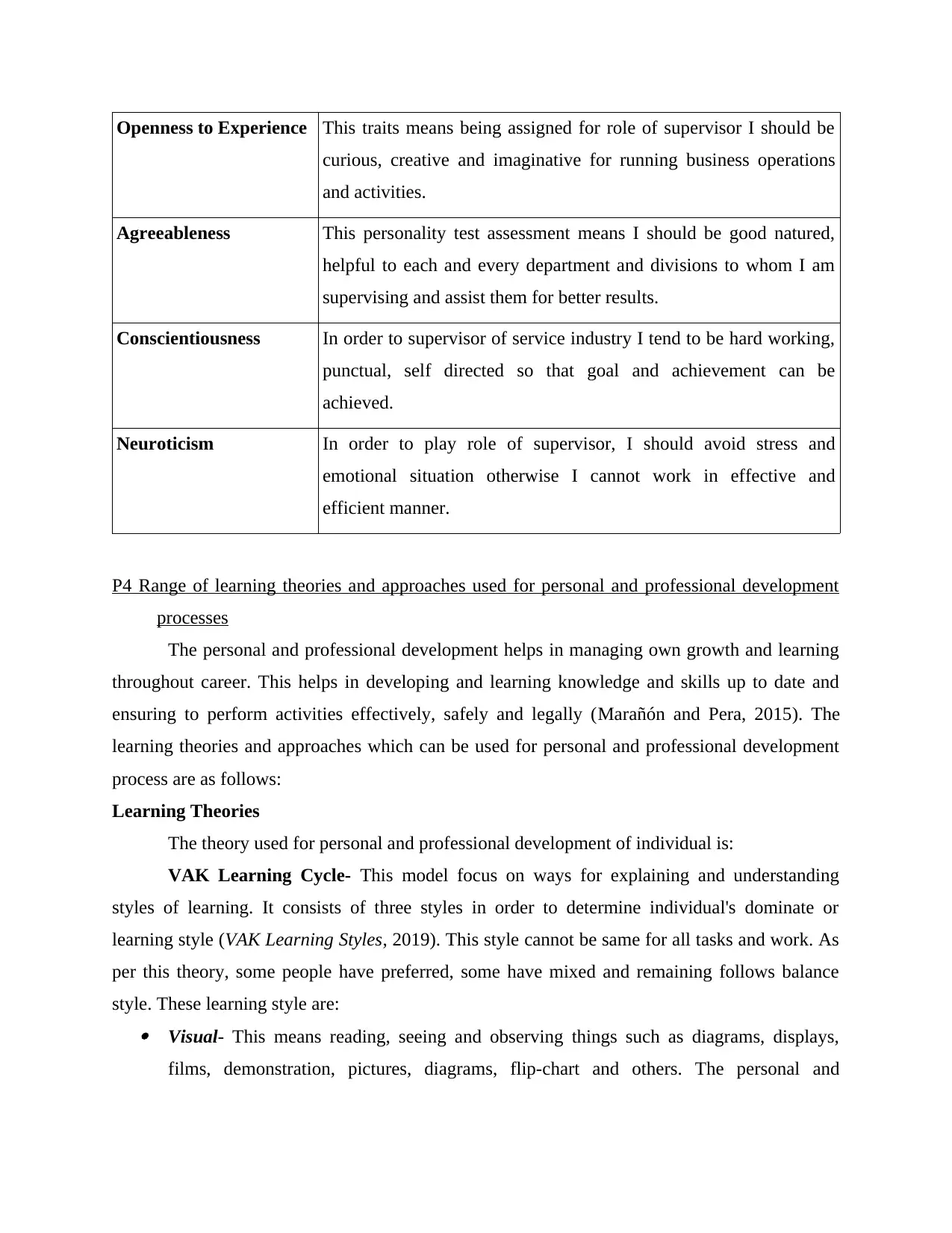
Openness to Experience This traits means being assigned for role of supervisor I should be
curious, creative and imaginative for running business operations
and activities.
Agreeableness This personality test assessment means I should be good natured,
helpful to each and every department and divisions to whom I am
supervising and assist them for better results.
Conscientiousness In order to supervisor of service industry I tend to be hard working,
punctual, self directed so that goal and achievement can be
achieved.
Neuroticism In order to play role of supervisor, I should avoid stress and
emotional situation otherwise I cannot work in effective and
efficient manner.
P4 Range of learning theories and approaches used for personal and professional development
processes
The personal and professional development helps in managing own growth and learning
throughout career. This helps in developing and learning knowledge and skills up to date and
ensuring to perform activities effectively, safely and legally (Marañón and Pera, 2015). The
learning theories and approaches which can be used for personal and professional development
process are as follows:
Learning Theories
The theory used for personal and professional development of individual is:
VAK Learning Cycle- This model focus on ways for explaining and understanding
styles of learning. It consists of three styles in order to determine individual's dominate or
learning style (VAK Learning Styles, 2019). This style cannot be same for all tasks and work. As
per this theory, some people have preferred, some have mixed and remaining follows balance
style. These learning style are: Visual- This means reading, seeing and observing things such as diagrams, displays,
films, demonstration, pictures, diagrams, flip-chart and others. The personal and
curious, creative and imaginative for running business operations
and activities.
Agreeableness This personality test assessment means I should be good natured,
helpful to each and every department and divisions to whom I am
supervising and assist them for better results.
Conscientiousness In order to supervisor of service industry I tend to be hard working,
punctual, self directed so that goal and achievement can be
achieved.
Neuroticism In order to play role of supervisor, I should avoid stress and
emotional situation otherwise I cannot work in effective and
efficient manner.
P4 Range of learning theories and approaches used for personal and professional development
processes
The personal and professional development helps in managing own growth and learning
throughout career. This helps in developing and learning knowledge and skills up to date and
ensuring to perform activities effectively, safely and legally (Marañón and Pera, 2015). The
learning theories and approaches which can be used for personal and professional development
process are as follows:
Learning Theories
The theory used for personal and professional development of individual is:
VAK Learning Cycle- This model focus on ways for explaining and understanding
styles of learning. It consists of three styles in order to determine individual's dominate or
learning style (VAK Learning Styles, 2019). This style cannot be same for all tasks and work. As
per this theory, some people have preferred, some have mixed and remaining follows balance
style. These learning style are: Visual- This means reading, seeing and observing things such as diagrams, displays,
films, demonstration, pictures, diagrams, flip-chart and others. The personal and
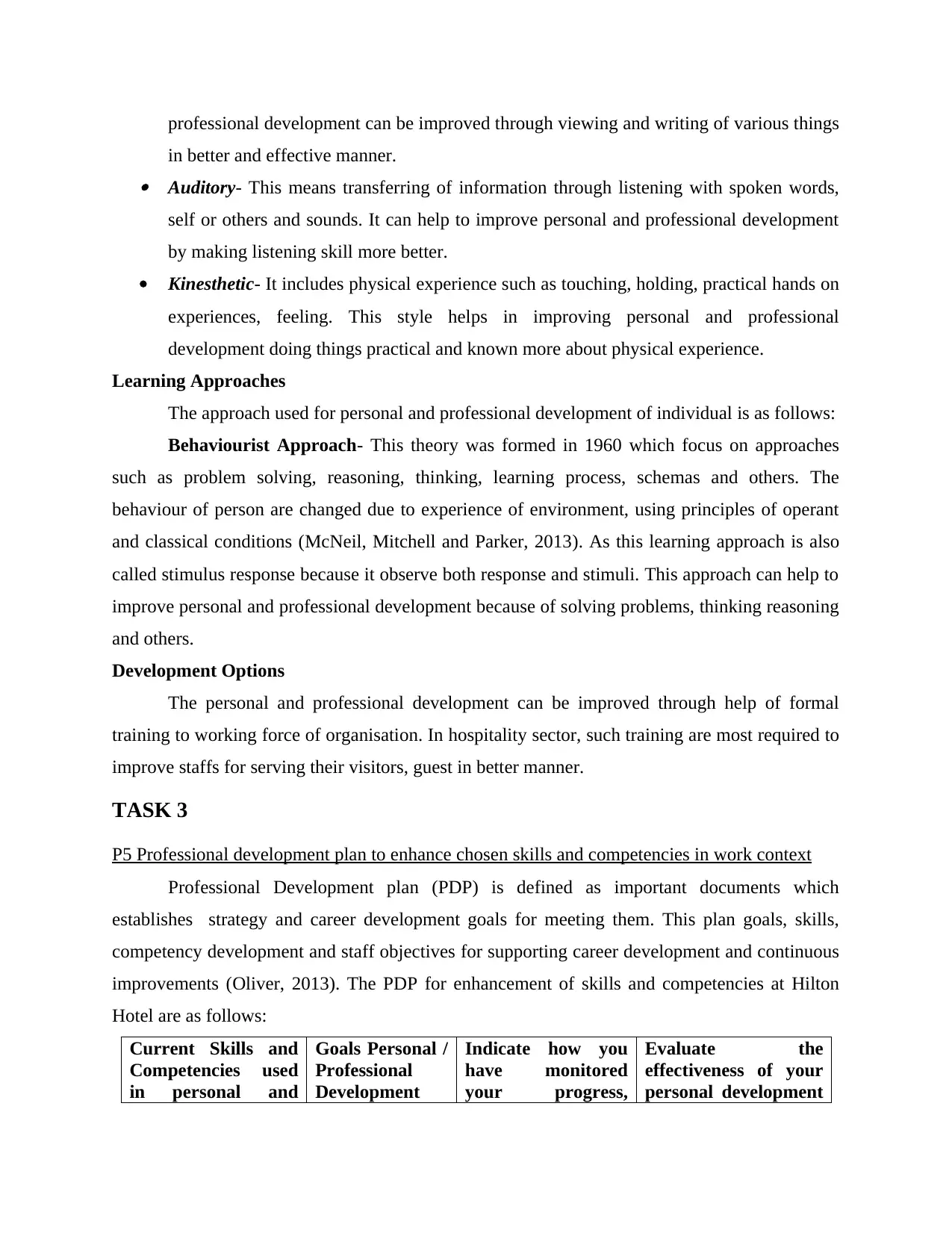
professional development can be improved through viewing and writing of various things
in better and effective manner. Auditory- This means transferring of information through listening with spoken words,
self or others and sounds. It can help to improve personal and professional development
by making listening skill more better.
Kinesthetic- It includes physical experience such as touching, holding, practical hands on
experiences, feeling. This style helps in improving personal and professional
development doing things practical and known more about physical experience.
Learning Approaches
The approach used for personal and professional development of individual is as follows:
Behaviourist Approach- This theory was formed in 1960 which focus on approaches
such as problem solving, reasoning, thinking, learning process, schemas and others. The
behaviour of person are changed due to experience of environment, using principles of operant
and classical conditions (McNeil, Mitchell and Parker, 2013). As this learning approach is also
called stimulus response because it observe both response and stimuli. This approach can help to
improve personal and professional development because of solving problems, thinking reasoning
and others.
Development Options
The personal and professional development can be improved through help of formal
training to working force of organisation. In hospitality sector, such training are most required to
improve staffs for serving their visitors, guest in better manner.
TASK 3
P5 Professional development plan to enhance chosen skills and competencies in work context
Professional Development plan (PDP) is defined as important documents which
establishes strategy and career development goals for meeting them. This plan goals, skills,
competency development and staff objectives for supporting career development and continuous
improvements (Oliver, 2013). The PDP for enhancement of skills and competencies at Hilton
Hotel are as follows:
Current Skills and
Competencies used
in personal and
Goals Personal /
Professional
Development
Indicate how you
have monitored
your progress,
Evaluate the
effectiveness of your
personal development
in better and effective manner. Auditory- This means transferring of information through listening with spoken words,
self or others and sounds. It can help to improve personal and professional development
by making listening skill more better.
Kinesthetic- It includes physical experience such as touching, holding, practical hands on
experiences, feeling. This style helps in improving personal and professional
development doing things practical and known more about physical experience.
Learning Approaches
The approach used for personal and professional development of individual is as follows:
Behaviourist Approach- This theory was formed in 1960 which focus on approaches
such as problem solving, reasoning, thinking, learning process, schemas and others. The
behaviour of person are changed due to experience of environment, using principles of operant
and classical conditions (McNeil, Mitchell and Parker, 2013). As this learning approach is also
called stimulus response because it observe both response and stimuli. This approach can help to
improve personal and professional development because of solving problems, thinking reasoning
and others.
Development Options
The personal and professional development can be improved through help of formal
training to working force of organisation. In hospitality sector, such training are most required to
improve staffs for serving their visitors, guest in better manner.
TASK 3
P5 Professional development plan to enhance chosen skills and competencies in work context
Professional Development plan (PDP) is defined as important documents which
establishes strategy and career development goals for meeting them. This plan goals, skills,
competency development and staff objectives for supporting career development and continuous
improvements (Oliver, 2013). The PDP for enhancement of skills and competencies at Hilton
Hotel are as follows:
Current Skills and
Competencies used
in personal and
Goals Personal /
Professional
Development
Indicate how you
have monitored
your progress,
Evaluate the
effectiveness of your
personal development
⊘ This is a preview!⊘
Do you want full access?
Subscribe today to unlock all pages.

Trusted by 1+ million students worldwide
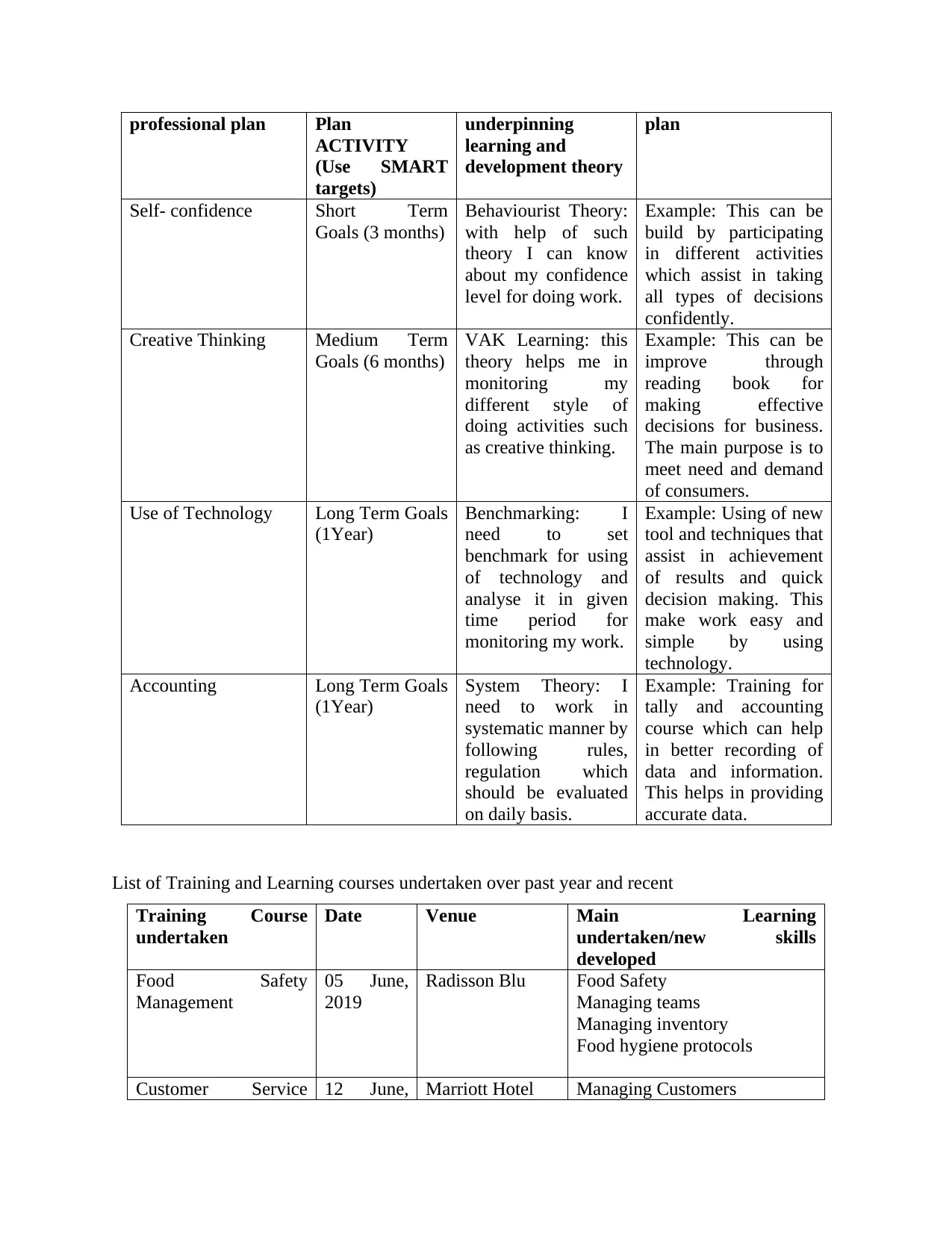
professional plan Plan
ACTIVITY
(Use SMART
targets)
underpinning
learning and
development theory
plan
Self- confidence Short Term
Goals (3 months)
Behaviourist Theory:
with help of such
theory I can know
about my confidence
level for doing work.
Example: This can be
build by participating
in different activities
which assist in taking
all types of decisions
confidently.
Creative Thinking Medium Term
Goals (6 months)
VAK Learning: this
theory helps me in
monitoring my
different style of
doing activities such
as creative thinking.
Example: This can be
improve through
reading book for
making effective
decisions for business.
The main purpose is to
meet need and demand
of consumers.
Use of Technology Long Term Goals
(1Year)
Benchmarking: I
need to set
benchmark for using
of technology and
analyse it in given
time period for
monitoring my work.
Example: Using of new
tool and techniques that
assist in achievement
of results and quick
decision making. This
make work easy and
simple by using
technology.
Accounting Long Term Goals
(1Year)
System Theory: I
need to work in
systematic manner by
following rules,
regulation which
should be evaluated
on daily basis.
Example: Training for
tally and accounting
course which can help
in better recording of
data and information.
This helps in providing
accurate data.
List of Training and Learning courses undertaken over past year and recent
Training Course
undertaken
Date Venue Main Learning
undertaken/new skills
developed
Food Safety
Management
05 June,
2019
Radisson Blu Food Safety
Managing teams
Managing inventory
Food hygiene protocols
Customer Service 12 June, Marriott Hotel Managing Customers
ACTIVITY
(Use SMART
targets)
underpinning
learning and
development theory
plan
Self- confidence Short Term
Goals (3 months)
Behaviourist Theory:
with help of such
theory I can know
about my confidence
level for doing work.
Example: This can be
build by participating
in different activities
which assist in taking
all types of decisions
confidently.
Creative Thinking Medium Term
Goals (6 months)
VAK Learning: this
theory helps me in
monitoring my
different style of
doing activities such
as creative thinking.
Example: This can be
improve through
reading book for
making effective
decisions for business.
The main purpose is to
meet need and demand
of consumers.
Use of Technology Long Term Goals
(1Year)
Benchmarking: I
need to set
benchmark for using
of technology and
analyse it in given
time period for
monitoring my work.
Example: Using of new
tool and techniques that
assist in achievement
of results and quick
decision making. This
make work easy and
simple by using
technology.
Accounting Long Term Goals
(1Year)
System Theory: I
need to work in
systematic manner by
following rules,
regulation which
should be evaluated
on daily basis.
Example: Training for
tally and accounting
course which can help
in better recording of
data and information.
This helps in providing
accurate data.
List of Training and Learning courses undertaken over past year and recent
Training Course
undertaken
Date Venue Main Learning
undertaken/new skills
developed
Food Safety
Management
05 June,
2019
Radisson Blu Food Safety
Managing teams
Managing inventory
Food hygiene protocols
Customer Service 12 June, Marriott Hotel Managing Customers
Paraphrase This Document
Need a fresh take? Get an instant paraphrase of this document with our AI Paraphraser
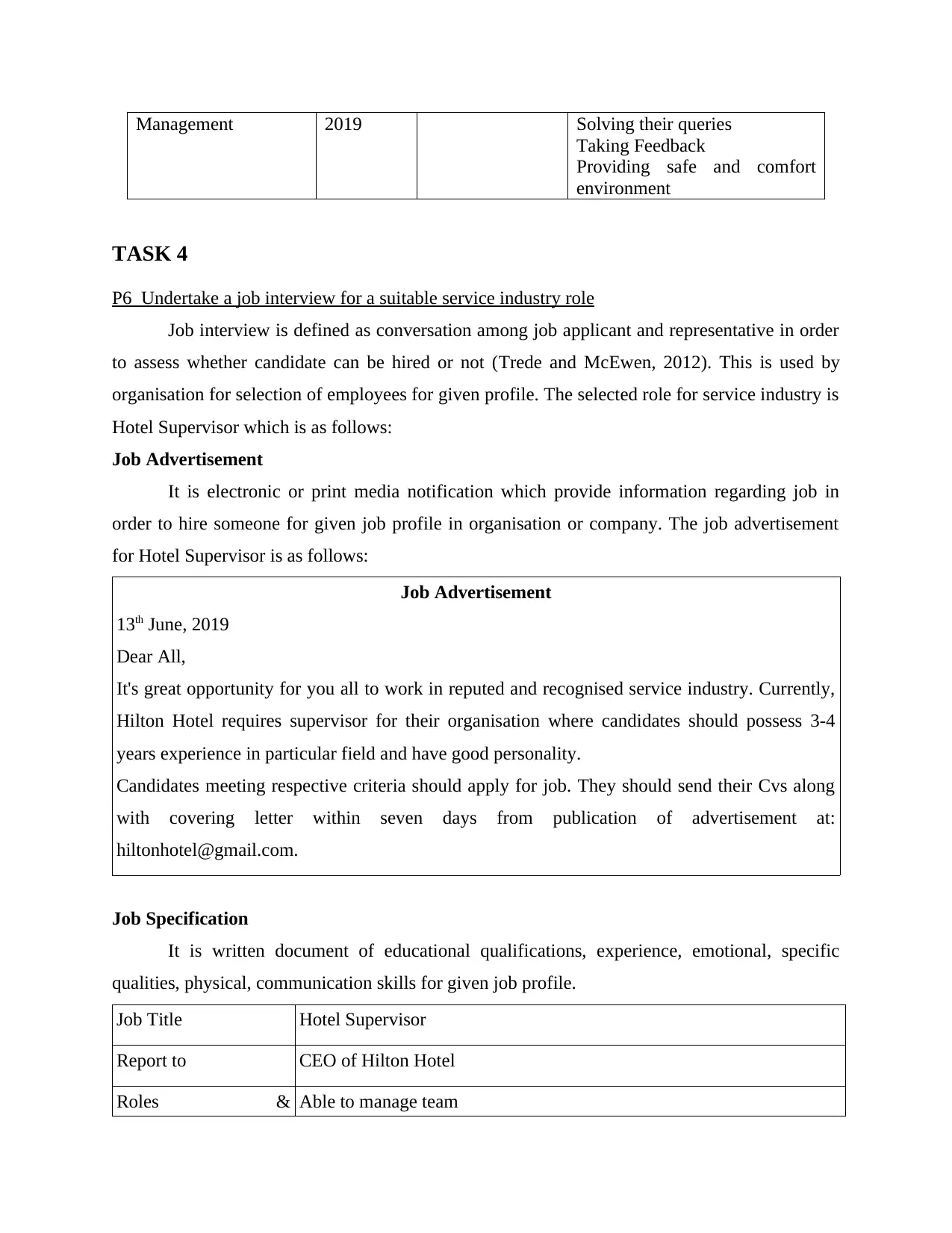
Management 2019 Solving their queries
Taking Feedback
Providing safe and comfort
environment
TASK 4
P6 Undertake a job interview for a suitable service industry role
Job interview is defined as conversation among job applicant and representative in order
to assess whether candidate can be hired or not (Trede and McEwen, 2012). This is used by
organisation for selection of employees for given profile. The selected role for service industry is
Hotel Supervisor which is as follows:
Job Advertisement
It is electronic or print media notification which provide information regarding job in
order to hire someone for given job profile in organisation or company. The job advertisement
for Hotel Supervisor is as follows:
Job Advertisement
13th June, 2019
Dear All,
It's great opportunity for you all to work in reputed and recognised service industry. Currently,
Hilton Hotel requires supervisor for their organisation where candidates should possess 3-4
years experience in particular field and have good personality.
Candidates meeting respective criteria should apply for job. They should send their Cvs along
with covering letter within seven days from publication of advertisement at:
hiltonhotel@gmail.com.
Job Specification
It is written document of educational qualifications, experience, emotional, specific
qualities, physical, communication skills for given job profile.
Job Title Hotel Supervisor
Report to CEO of Hilton Hotel
Roles & Able to manage team
Taking Feedback
Providing safe and comfort
environment
TASK 4
P6 Undertake a job interview for a suitable service industry role
Job interview is defined as conversation among job applicant and representative in order
to assess whether candidate can be hired or not (Trede and McEwen, 2012). This is used by
organisation for selection of employees for given profile. The selected role for service industry is
Hotel Supervisor which is as follows:
Job Advertisement
It is electronic or print media notification which provide information regarding job in
order to hire someone for given job profile in organisation or company. The job advertisement
for Hotel Supervisor is as follows:
Job Advertisement
13th June, 2019
Dear All,
It's great opportunity for you all to work in reputed and recognised service industry. Currently,
Hilton Hotel requires supervisor for their organisation where candidates should possess 3-4
years experience in particular field and have good personality.
Candidates meeting respective criteria should apply for job. They should send their Cvs along
with covering letter within seven days from publication of advertisement at:
hiltonhotel@gmail.com.
Job Specification
It is written document of educational qualifications, experience, emotional, specific
qualities, physical, communication skills for given job profile.
Job Title Hotel Supervisor
Report to CEO of Hilton Hotel
Roles & Able to manage team
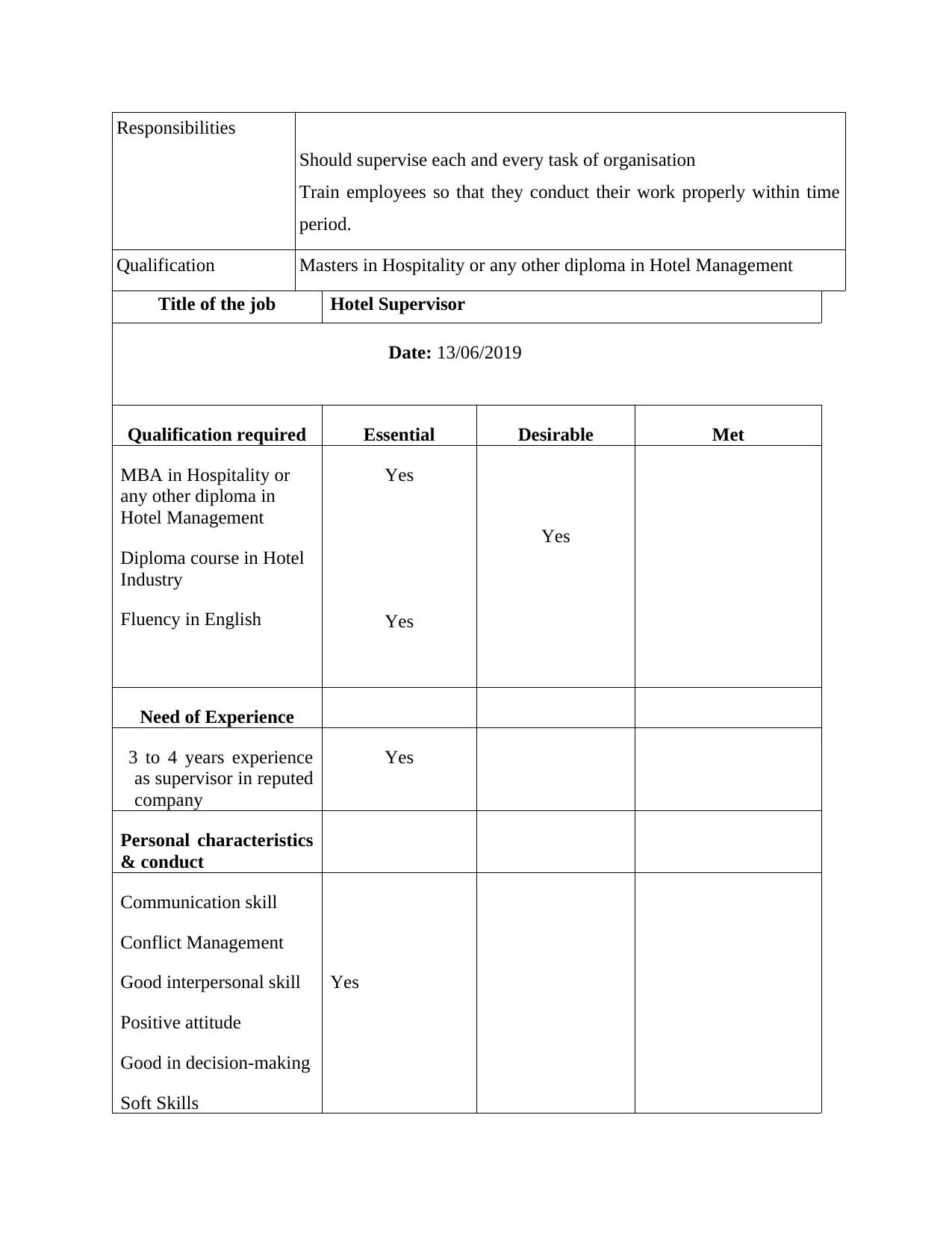
Responsibilities
Should supervise each and every task of organisation
Train employees so that they conduct their work properly within time
period.
Qualification Masters in Hospitality or any other diploma in Hotel Management
Title of the job Hotel Supervisor
Date: 13/06/2019
Qualification required Essential Desirable Met
MBA in Hospitality or
any other diploma in
Hotel Management
Diploma course in Hotel
Industry
Fluency in English
Yes
Yes
Yes
Need of Experience
3 to 4 years experience
as supervisor in reputed
company
Yes
Personal characteristics
& conduct
Communication skill
Conflict Management
Good interpersonal skill
Positive attitude
Good in decision-making
Soft Skills
Yes
Should supervise each and every task of organisation
Train employees so that they conduct their work properly within time
period.
Qualification Masters in Hospitality or any other diploma in Hotel Management
Title of the job Hotel Supervisor
Date: 13/06/2019
Qualification required Essential Desirable Met
MBA in Hospitality or
any other diploma in
Hotel Management
Diploma course in Hotel
Industry
Fluency in English
Yes
Yes
Yes
Need of Experience
3 to 4 years experience
as supervisor in reputed
company
Yes
Personal characteristics
& conduct
Communication skill
Conflict Management
Good interpersonal skill
Positive attitude
Good in decision-making
Soft Skills
Yes
⊘ This is a preview!⊘
Do you want full access?
Subscribe today to unlock all pages.

Trusted by 1+ million students worldwide
1 out of 17
Related Documents
Your All-in-One AI-Powered Toolkit for Academic Success.
+13062052269
info@desklib.com
Available 24*7 on WhatsApp / Email
![[object Object]](/_next/static/media/star-bottom.7253800d.svg)
Unlock your academic potential
Copyright © 2020–2026 A2Z Services. All Rights Reserved. Developed and managed by ZUCOL.





